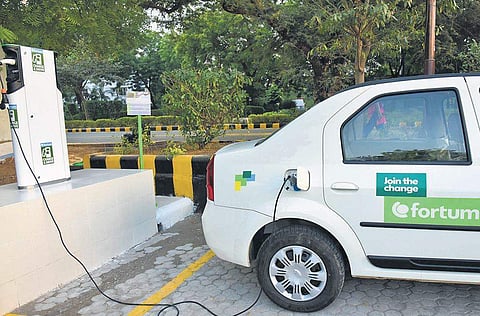

NEW DELHI: The Delhi government has constituted a high-level committee in order to boost its electric vehicle policy on ground. The 11-member team will work with the Centre to promote the adoption of electric vehicles among people. The committee will have members from the Delhi Dialogue and Development Commission, municipal corporations, power and transport departments.
The mandate of the group will be to coordinate with various departments and agencies for vehicle charging infrastructure and present reports to the power and transport minister on challenges in the rollout of Delhi Electric Vehicle Policy 2018.
The primary objective of the Delhi EV Policy 2018 is to bring about a material improvement in Delhi’s air quality by bringing down emissions from transport sector. To do so, the policy states to seek rapid adoption of Battery Electric Vehicles (BEVs) in a manner where they contribute to 25 per cent of all new vehicle registrations by 2023.
The policy will include setting up a charging point every three kilometres, over the next three years, to facilitate proliferation of EVs. For this, the government will seek participation from private players.
The target is to have a fourth of the vehicles registered annually - public and private - to be electric by 2024 to curb vehicular pollution. For public transport, the government is looking to have 50 per cent of the new vehicles registered to be electric in five years and has already announced its plan to provide 1,000 low-floor battery-run buses for public transport.
Recently the Delhi Electricity Regulatory Commission (DERC) which announced the latest tariffs rates promoted pollution-free transportation by reducing rates at charging stations. For e-rickshaw and e-vehicles for low-tension consumers has been cut down from Rs 5.50 per unit to Rs 4.50 per unit and for high-tension consumers, it has been reduced from Rs 5 per unit to Rs 4 per unit.
In order to provide cleaner air, locations for charging stations will be made available by the government in every district along with bare minimum lease rentals. These locations will be carved out from existing public parking zones, bus depots and metro stations. The Delhi government will provide a capital subsidy covering cost of chargers and installation expenses to the winning bidder in a district, the Delhi EV Policy 2018 states.
HELP FOR THREE-WHEELERS
An open permit system will apply to approved e-autos, with no limits on the number of Auto Rickshaw Permits (‘e-auto Permits’) to be issued. Road tax, registration charges, MCD one-time parking fee and Auto Rickshaw Permit fees will be waived for e-autos